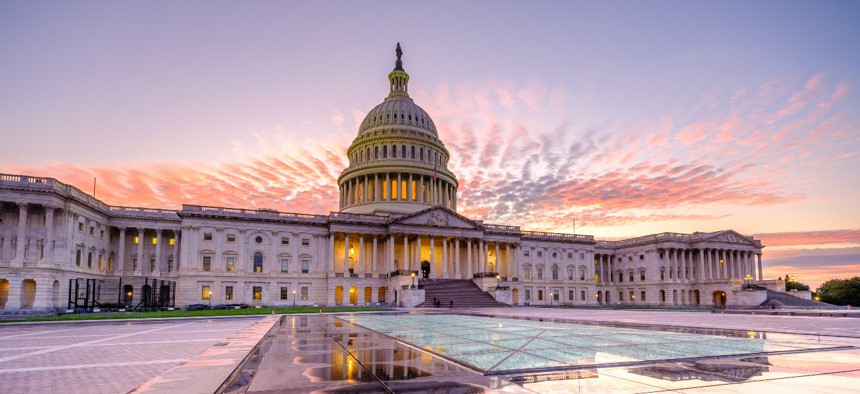
The spending bills are likely to go through significant revisions as they make their way through both chambers of Congress. John Baggaley / Getty Images
Hiring, Body Cams, EVs for Feds and Other Takeaways From House Democrats’ 2023 Spending Priorities
Democrats differed from the president in some key respects in their initial fiscal 2023 funding bills.
House Democrats have begun preliminary votes on their fiscal 2023 spending packages, laying out their priorities as part of nearly across-the-board significant increases for federal agencies.
The proposed funding, put forward by leaders of the House Appropriations Committee, aligned with much of the blueprint offered by President Biden in his budget, but differed in some key areas. Congressional Democrats are looking to provide a much larger increase for the Homeland Security Department, for example, and would not fully fund the president’s requests in other areas. The House is moving ahead with an overall spending cap of $1.6 trillion for the year, roughly in line with Biden’s total ask.
Republicans have already voiced many concerns with the bills Democrats have unveiled and the measures typically go through significant revisions in the Senate to win over the bipartisan support required in that chamber. The two parties will have to iron out a top-line number and determine how much will go into the defense and non-defense buckets, as Republicans have said Democrats are underfunding the Pentagon. Still, the bills lay out the priorities Democrats in Congress would like to see at federal agencies and give a sense of the starting point for negotiations. Current funding is set to expire at the end of September, just weeks before the midterm elections. Here is a look at some of the key provisions in the House bills so far:
- Electrifying the federal fleet: The Financial Services and General Government bill, one of 12 lawmakers must pass each year to fund government, would provide $100 million for a new fund with the General Services Administration to procure new electric vehicles and to build out charging stations on federal property. “As we combat the climate crisis from all fronts, this bill would start the transition of the federal vehicle fleet to electric and zero emission vehicles,” said Rep. Rosa DeLauro, D-Conn., who chairs the appropriations panel.
- Boosting DHS: The Homeland Security bill would increase funding at the department by $2.8 billion compared to current spending levels, and by $3.8 billion compared to Biden’s request. Some of that money would go toward new customs officers within Customs and Border Protection, lawmakers said, which has been a longstanding priority for the agency. U.S. Citizenship and Immigration Services would see its budget shoot up by 67%, though that would still be $274 million less than Biden’s request. Lawmakers identified nearly $300 million that would go toward reducing asylum and refugee backlogs. CBP and Immigration and Customs Enforcement would receive funding to provide all their officers and agents with body cameras, which Biden recently ordered through an executive order.
- Elections: The Election Assistance Commission would see its funding for election security grants more than quintuple to $400 million. The agency would see its operating budget spike by 70%. “We are also dedicated to protecting every facet of American democracy,” said Rep. Mike Quigley, D-Ill., who authored the spending bill including EAC. “That means funding for election security as we head to the polls this November.”
- Food safety: The bill to fund the Agriculture Department would for the first time in several years provide separate funding for salary and pension costs for the Food and Drug Administration, leaving a bigger pool for the agency’s core responsibilities. Lawmakers proposed spending $1.2 billion on food safety inspections, which would support more personnel for both meatpacking plants—at USDA’s Food Safety Inspection Service—and facilities in FDA’s jurisdiction—such as baby formula plants. It would also authorize and fund unannounced inspections at foreign facilities. A recent Government Accountability Office report found those inspections were generally preannounced and occurring with less frequency.
- Pay issues: In March, Biden in his budget proposal included an average 4.6% pay raise for federal civilian employees. The Financial Services and General Government bill, typically the vehicle for altering the president’s suggestion, was silent on the issue. That would allow the 4.6% raise to go through, though Congress can still intervene later in the year. The DHS bill would also follow Biden’s proposal to provide Transportation Security Administration employees with a pay bump by bringing their salaries in line with the rest of the federal government’s payscale.
- Veterans: The bill funding the Veterans Affairs Department would see a 20% boost, though the $135 billion in discretionary funding came in slightly below Biden’s request. Virtually all of the increase would go toward veterans health care, which would for the first time be categorized in a separate, third category of discretionary spending.







